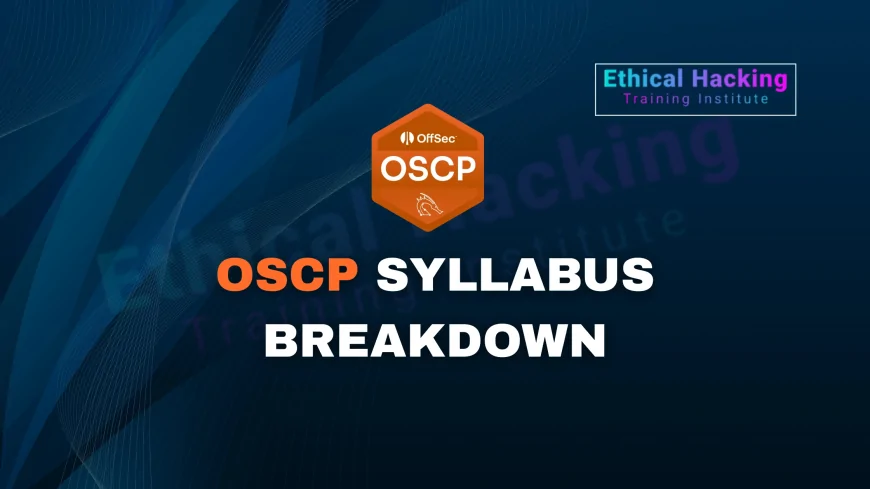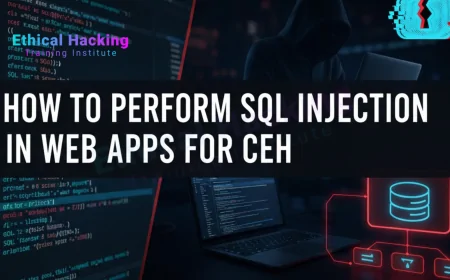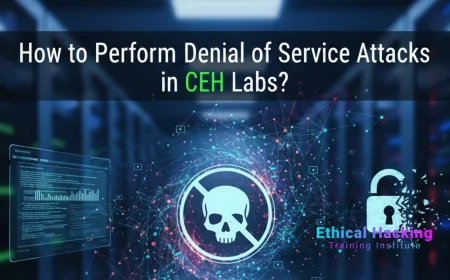Comprehensive OSCP Syllabus Breakdown | Detailed Topics and Modules You Must Know
Discover the complete OSCP syllabus with detailed topics and modules. Learn what skills and knowledge areas are covered in the OSCP Penetration Testing with Kali Linux course to prepare effectively for the certification.

The OSCP (Offensive Security Certified Professional) certification is one of the most respected and challenging certifications in the field of ethical hacking and penetration testing. Offered by Offensive Security, OSCP tests practical skills in identifying and exploiting vulnerabilities in real-world scenarios. Understanding the OSCP syllabus is essential for candidates to plan their studies effectively and pass this rigorous exam.
In this blog, we will explore the detailed topics and modules covered in the OSCP syllabus, helping you gain clarity on what to expect and how to prepare for your ethical hacking journey.
What Does the OSCP Certification Cover?
The OSCP certification is highly practical and hands-on, focusing on real-world penetration testing techniques. The syllabus is structured around the Penetration Testing with Kali Linux (PWK) course material, which includes labs, exercises, and the final exam.
The syllabus is divided into several key modules, each targeting specific skills and knowledge areas critical for penetration testing.
Detailed OSCP Syllabus Topics and Modules
1. Introduction to Penetration Testing
-
Overview of penetration testing methodologies
-
Understanding the ethical hacking mindset
-
Legal considerations and scope definitions
-
Tools and environment setup, mainly using Kali Linux
2. Basic Linux and Windows Commands
-
Navigating and manipulating files in Linux
-
Basic Windows commands and PowerShell basics
-
Text processing tools like
grep,awk, andsed -
Networking basics: IP addressing, netstat, and ping
3. Information Gathering
-
Passive and active reconnaissance
-
WHOIS, DNS enumeration, and network scanning
-
Tools: Nmap, Netdiscover, and Nikto
-
Fingerprinting operating systems and services
4. Vulnerability Scanning
-
Automated scanning tools: OpenVAS, Nessus
-
Manual vulnerability detection techniques
-
Analyzing scan results and prioritizing targets
5. Exploitation Techniques
-
Buffer overflows: fundamentals and exploitation on Linux and Windows
-
Exploiting web vulnerabilities: SQL injection, command injection, file inclusion
-
Password attacks: brute force, dictionary attacks, and hash cracking
-
Privilege escalation techniques on Linux and Windows
6. Post Exploitation
-
Maintaining access: creating backdoors, persistence methods
-
Data exfiltration techniques
-
Clearing logs and covering tracks
7. Client-Side Attacks
-
Social engineering basics
-
Exploiting client-side vulnerabilities
-
Using tools like Metasploit for client-side attacks
8. Password Attacks
-
Password policy analysis
-
Using tools like Hydra, John the Ripper, and Hashcat
-
Cracking password hashes and leveraging password reuse
9. Web Application Attacks
-
Identifying common web vulnerabilities (OWASP Top 10)
-
Cross-Site Scripting (XSS), Cross-Site Request Forgery (CSRF)
-
SQL Injection techniques and prevention
-
File upload vulnerabilities
10. Port Redirection and Tunneling
-
Using SSH tunneling and proxy chains
-
Bypassing firewalls and network restrictions
11. Active Directory Attacks
-
Enumeration of Active Directory environments
-
Exploiting misconfigurations and trust relationships
-
Kerberos attacks and password spraying
How Is the OSCP Syllabus Delivered?
The OSCP syllabus is delivered through the Penetration Testing with Kali Linux (PWK) course, which includes:
-
PDF course materials: Detailed theoretical concepts and practical examples.
-
Video tutorials: Step-by-step demonstrations of key techniques.
-
Hands-on labs: Access to a vulnerable lab environment with various machines to practice penetration testing.
-
Exam: A 24-hour practical penetration test exam to assess your skills.
Why Is Knowing the OSCP Syllabus Important?
Understanding the syllabus helps you:
-
Focus on the right topics without wasting time
-
Build a study schedule based on syllabus modules
-
Prepare for both the theory and practical aspects of the exam
-
Gain confidence by practicing the specific skills tested
OSCP Syllabus Summary Table
| Module | Key Topics Covered |
|---|---|
| Introduction to Penetration Testing | Ethical hacking basics, legal scope, Kali Linux setup |
| Basic Linux & Windows Commands | Command line skills, text processing, networking basics |
| Information Gathering | Reconnaissance, scanning, fingerprinting |
| Vulnerability Scanning | Automated/manual scans, analyzing results |
| Exploitation Techniques | Buffer overflows, web exploits, password attacks |
| Post Exploitation | Maintaining access, data exfiltration |
| Client-Side Attacks | Social engineering, Metasploit use |
| Password Attacks | Cracking techniques, password policy analysis |
| Web Application Attacks | XSS, SQLi, CSRF, file uploads |
| Port Redirection & Tunneling | SSH tunneling, proxy chains |
| Active Directory Attacks | AD enumeration, Kerberos attacks |
Final Thoughts
The OSCP syllabus is designed to provide comprehensive, hands-on penetration testing skills, covering a broad range of topics from basic commands to advanced exploitation techniques. Thoroughly understanding and following this syllabus will prepare you well for the OSCP exam and a successful career in cybersecurity.
If you want expert guidance and structured training aligned with the OSCP syllabus, the Ethical Hacking Training Institute offers industry-recognized courses with practical lab access and expert mentors to help you succeed.
FAQs:
What topics are covered in the OSCP syllabus?
The OSCP syllabus covers penetration testing fundamentals, network scanning, vulnerability analysis, exploitation techniques, post-exploitation, privilege escalation, web application attacks, and report writing.
How is the OSCP syllabus structured?
The syllabus is divided into modules, starting from basics like Linux commands, moving to network scanning, exploitation of vulnerabilities, and ending with complex attack simulations and lab exercises.
What is the PWK course in the OSCP syllabus?
PWK (Penetration Testing with Kali Linux) is the official training course for OSCP certification, covering all core syllabus topics through theory, practical labs, and exercises.
Does the OSCP syllabus include web application attacks?
Yes, the syllabus includes web vulnerabilities like SQL injection, cross-site scripting (XSS), and file inclusion attacks.
What exploitation techniques are taught in the OSCP syllabus?
It covers buffer overflows, privilege escalation, password attacks, and exploitation of network services.
Are Linux and Windows commands part of the OSCP syllabus?
Yes, OSCP training includes essential Linux and Windows command-line skills needed for effective penetration testing.
How important is the OSCP syllabus for exam preparation?
Following the syllabus closely is crucial to understand the exam scope and effectively prepare for all required skills.
Does the OSCP syllabus cover post-exploitation methods?
Yes, it covers methods like maintaining access, clearing logs, and gathering sensitive data after successful exploitation.
Are password attacks included in the OSCP training?
Yes, password cracking and brute-force techniques are an integral part of the syllabus.
What tools are used in the OSCP course labs?
Common tools include Nmap, Netcat, Metasploit, Hydra, Burp Suite, and custom scripts.
Is there a lab environment in the OSCP syllabus?
Yes, the PWK course provides access to a virtual lab environment for hands-on practice.
How long does it take to complete the OSCP syllabus?
Typically, the syllabus can be completed in 2-3 months with dedicated study and lab time.
Can beginners follow the OSCP syllabus?
Beginners with basic networking and Linux knowledge can follow the syllabus, but prior experience helps in faster progress.
Does the OSCP syllabus include active directory attacks?
Yes, attacking Active Directory environments and understanding Windows domain vulnerabilities is part of the syllabus.
What is the focus of the OSCP exploitation module?
The focus is on practical exploitation of real-world vulnerabilities using manual and automated tools.
How does the OSCP syllabus help in real-world hacking?
It trains you in practical, hands-on penetration testing skills applicable in professional cybersecurity roles.
What are the key skills gained from the OSCP syllabus?
Skills include network scanning, vulnerability analysis, exploit development, privilege escalation, and reporting.
Are client-side attacks covered in the OSCP syllabus?
Yes, the syllabus includes client-side attacks like phishing and social engineering basics.
How do I access the OSCP course materials?
Course materials are provided by the training provider upon enrollment and include PDFs, videos, and lab access.
Is the OSCP syllabus updated regularly?
Yes, the syllabus is periodically updated to include new attack vectors and tools.
Does the OSCP syllabus include network tunneling?
Yes, it covers techniques to bypass network restrictions using tunneling methods.
What legal topics are covered in OSCP training?
Ethical and legal considerations for penetration testing and responsible disclosure are part of the syllabus.
Can the OSCP syllabus help in career advancement?
Absolutely, OSCP certification is highly respected and boosts career prospects in cybersecurity.
How practical is the OSCP syllabus training?
It is highly practical, focusing on real-world scenarios and hands-on lab exercises.
What prerequisites are needed for the OSCP syllabus?
Basic knowledge of networking, Linux, and programming helps, but not mandatory.
How do I plan study based on the OSCP syllabus?
Create a schedule balancing theory reading, lab practice, and revision of each module systematically.
Are video tutorials part of the OSCP syllabus?
Yes, the course includes video lessons to complement written materials.
Does the OSCP syllabus include buffer overflow attacks?
Yes, buffer overflow exploitation is a key module in the syllabus.
How does the OSCP syllabus address web vulnerabilities?
It includes detailed methods for identifying and exploiting web app vulnerabilities like SQLi and XSS.
Is penetration testing methodology explained in OSCP training?
Yes, a step-by-step penetration testing methodology forms the foundation of the OSCP syllabus.
What's Your Reaction?
 Like
0
Like
0
 Dislike
0
Dislike
0
 Love
0
Love
0
 Funny
0
Funny
0
 Angry
0
Angry
0
 Sad
0
Sad
0
 Wow
0
Wow
0
















